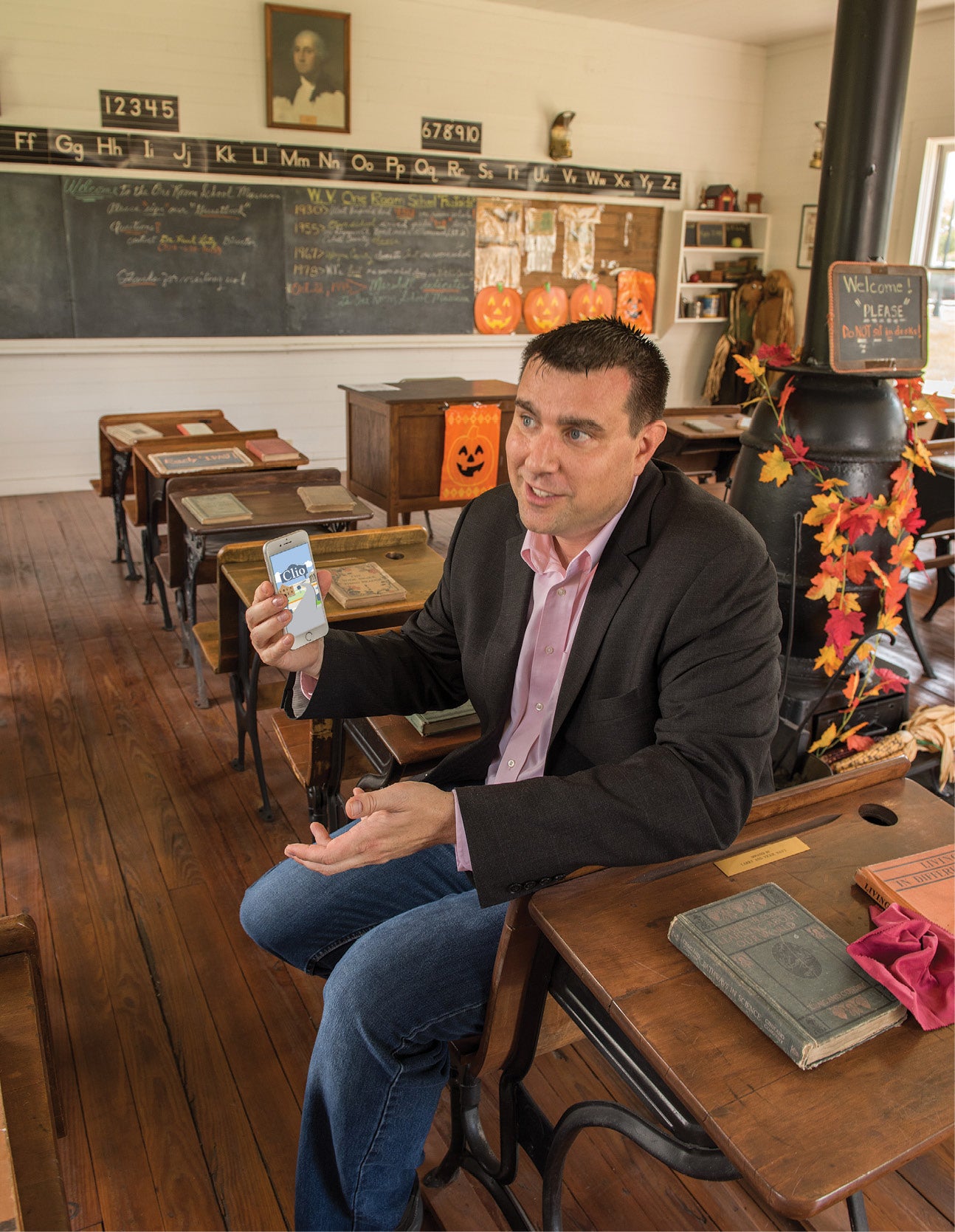 Dr. David Trowbridge has literally put local and national history in the palm of your hand.
Dr. David Trowbridge has literally put local and national history in the palm of your hand.
Most people with ties to Marshall know how important the school’s past is to its present. All that the university has accomplished and overcome is both a source of pride and inspiration for the future. History has a way of doing that, whether you’re talking about a university, the Statue of Liberty, Gettysburg or historic buildings in small town across America.
Dr. David Trowbridge, an associate professor of history, has always known that. What stumped him for quite some time, however, was how to place the historical significance of what we see around us in an easy-to-find place.
He came up with an answer in 2013: mobile phones. That was when he conceived the idea for the Clio mobile app, which can also be found online at www.theclio.com. The app is free and allows users to identify significant historical and cultural places close to their location. For instance, pulling up the app in downtown Huntington would include entries on 300 historical sites and events, including several guided walking tours of the city.
The app has become a nationally recognized tool that puts GPS-guided information on historical and cultural sites in the hands of tourists and history buffs, bringing history to the fingertips of users. Anyone can create entries about different historical locations for the app to be seen by Clio users, so long as they’re willing to submit their entries and go through Trowbridge’s screening process, which allows editing privileges for trusted contributors and experts.
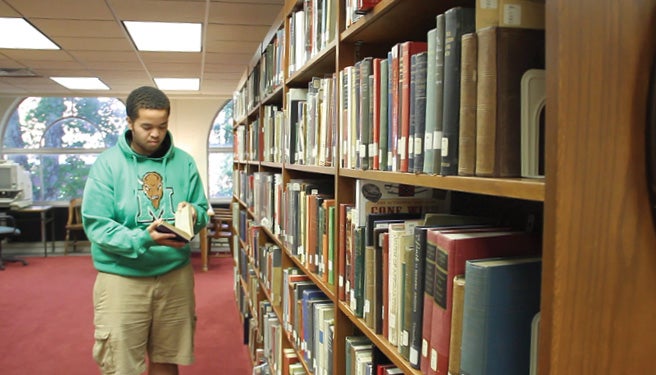 Trowbridge’s work most recently has received a $60,000 matching grant from the National Endowment for the Humanities.
Trowbridge’s work most recently has received a $60,000 matching grant from the National Endowment for the Humanities.
“For a historian, this is especially meaningful,” he said. “With the support of this $60,000 grant, the university will offer paid positions for graduate and undergraduate students to work with faculty members and local organizations as they build dozens of walking tours in communities throughout West Virginia.”
Those who would like to support the project can contact Trowbridge or the Marshall University Foundation.
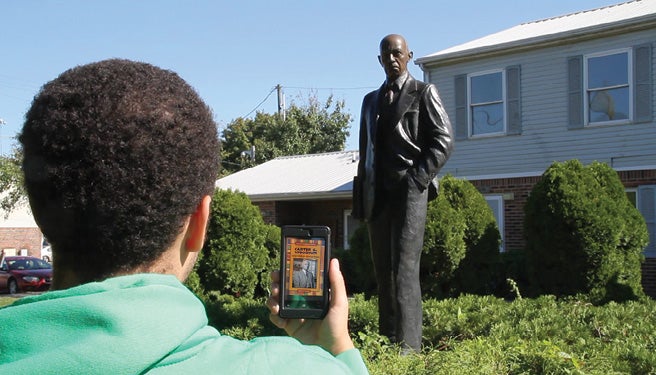 Clio also was recently among a handful of humanities projects awarded a Whiting Public Engagement Fellowship and has received a $35,000 grant from the Knight Foundation.
Clio also was recently among a handful of humanities projects awarded a Whiting Public Engagement Fellowship and has received a $35,000 grant from the Knight Foundation.
The idea for Clio came to Trowbridge while he was at a conference in Indianapolis. While there he wanted to learn about the history in the city. Online searches were too laborious, so he gave up and decided to get something to eat, which was easy, considering all the commercial apps that are available to help find nearby restaurants. So Trowbridge thought to himself, “Why couldn’t an app do that for history?”
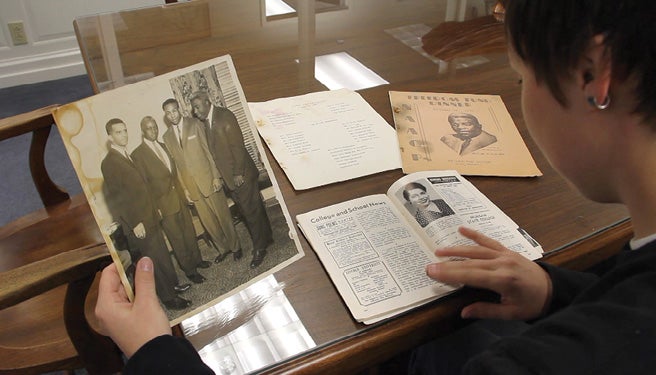 On track to have more than 6 million page views for the year 2017, Clio is a project that has been used at some 200 colleges across America, garnered attention from some prestigious national organizations and grown to be a true point of pride for Marshall University.
On track to have more than 6 million page views for the year 2017, Clio is a project that has been used at some 200 colleges across America, garnered attention from some prestigious national organizations and grown to be a true point of pride for Marshall University.
It has been spotlighted as a tech innovator by PCMag, putting Marshall in the same company as institutions such as Stanford, UCLA, the University of Virginia and Boston College. It also was the subject of a recent article on the American Historical Association website.
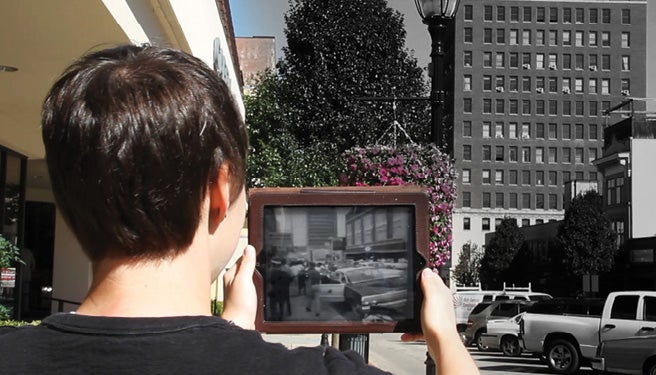 “It’s been extraordinarily rewarding to see the accolades Clio and Dr. Trowbridge’s team have received,” said Marshall President Jerome A. Gilbert. “Everyone involved, from our faculty to our students to our librarians, has taken real ownership of Clio and worked to refine, improve and grow the app and website.”
“It’s been extraordinarily rewarding to see the accolades Clio and Dr. Trowbridge’s team have received,” said Marshall President Jerome A. Gilbert. “Everyone involved, from our faculty to our students to our librarians, has taken real ownership of Clio and worked to refine, improve and grow the app and website.”
The more entries created, the more historical information people can get from the app as they peruse America’s cities and towns. Each entry includes a summary of the location’s historical significance, links to further information, photos and in some cases, 360-degree imagery and Google street-mapping options.
Gilbert, a history buff himself, said he appreciates the app for teaching him about the world around him, and he thinks it will serve as a boost to the heritage tourism industry in this state and others.
“The speed at which the number of entries has increased alone is a testament to the utility of his concept,” Gilbert said. “I commend Dr. Trowbridge’s approach toward developing a digital project that assures accuracy by also involving subject-area experts, students and scholars throughout each step of the process. Their system for peer-reviewed entries can serve as an example for others looking to connect the public engagement of crowdsourcing with the need for review by subject matter experts.”
Clio was something simply born out of necessity, said Trowbridge, who earned his Ph.D. from the University of Kansas in 2008 and spent 12 years serving in the Kansas and then West Virginia National Guard. He was a firefighter with the National Guard, serving in Iraq in 2005, and he joined Marshall in 2008.
While in Huntington for his interview, Trowbridge called his girlfriend, Whitney, now his wife, and told her he felt like he was home. They have two young daughters and a home on Huntington’s Southside, with a view of the Memorial Arch.
Trowbridge did a small trial with his students one semester, having them create entries for a theoretical history app.
“Just seeing how my students responded to the idea, I knew that this was something that needed to exist,” he said. “I knew there would be commercial applications for it, but they would be motivated by different factors than historians would. Part of the beauty is that entries are made by local people with no agenda other than to say, ‘Here are 10 places you should see in our town, and here’s their backstory.’”
Trowbridge is thrilled with how Clio is helping students grow. They do research that involves calling and setting up meetings with people, gathering images and information and boiling it down into something that is both detailed and concise enough to consume on a mobile app.
“This is a partnership. My name is on the entries next to yours. If your first draft is a D, I can’t leave it at that. I’ve got to get you to at least a B. That’s teaching with a capital T.”
Dozens of professors at other institutions have started using the Clio app in their teaching as well. A professor at New York University is planning a Clio-based project with his students involving the 100-year anniversary of World War I. A professor at Illinois College uses Clio with her first-year students.
Trowbridge is also glad that the website has that big green “M” at the bottom of the page, reminding Clio users that it was created at Marshall University.
“Just knowing that tools made here are being used by Ivy League institutions might help show potential students that, you know what, Marshall can build great things, too.”
A number of universities — from Marshall to Yale to Virginia Tech to the University of Richmond — have created walking tours with Clio.
“Clio is the product of remarkable ingenuity and devotion by Professor Trowbridge, a wonderful gift to the nation,” notes Dr. Edward Ayers, President Emeritus, University of Richmond.
Marshall’s walking tour includes features like a 360-degree image of Joan C. Edwards Stadium with an oral history by former Herd quarterback Chad Pennington.
“History is like air. We take it for granted, but you can’t understand the present or conceive of the future without first considering history,” Trowbridge said. “Whenever you explore any topic, history is where you start. You don’t realize you’re doing that, but when you make a decision in your personal life, you base your decision on past experience. History is the study of past experience.”
“People dig history. I didn’t fully understand how much people are thirsty for history before I did this,” he explained.
With over 25,000 historical entries from across the country, Clio really is, as their website states, “your guide to the history around you.”
Jean Hardiman is a freelance writer living in Huntington, West Virginia. She recently accepted a position as university relations specialist at Marshall.
Photos: (Top) David Trowbridge, an associate professor of history at Marshall, developed the nationally recognized Clio mobile app that puts GPS-guided information of historical and cultural sites in the hands of tourists and history buffs.(Second from top)Research begun in the library can be complemented by the Clio app. Huntington native Carter G. Woodson, the man widely recognized as “Father of Black History Month,” is on Clio with biographical information and statue location. (Third from top) Because of content contributed by Marshall faculty, students and librarians, anyone interested in Civil Rights history can use the Clio mobile app to show where in Huntington marches and protests took place. Photos by Rick Lee.
 Dr. David Trowbridge has literally
Dr. David Trowbridge has literally